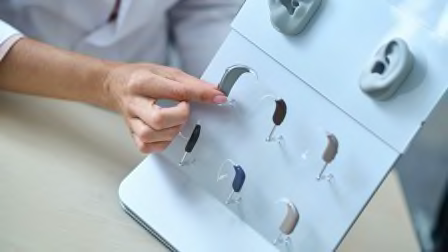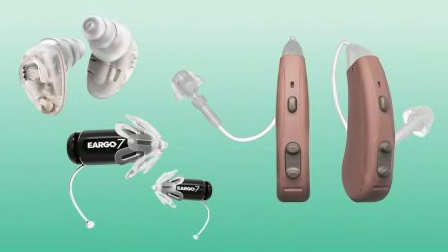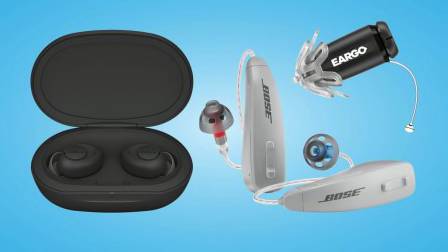Why You Shouldn't Put Off Getting Hearing Aids
Some myths and truths when it comes to these vital devices

More than 28 million adults in the U.S. could benefit from a hearing aid. But among people ages 70 and older, less than a third of those who could use the device have ever tried one. A study published in 2019 in the journal Ear and Hearing found that people diagnosed with enough hearing loss to be eligible for hearing aids waited an average of almost nine years to get them.
A delay in getting hearing aids means a delay in enjoying their benefits, which research has found include not only improved listening ability but also a better quality of life. A study published in 2019 in the Journal of the American Geriatrics Society found that using hearing aids may even be linked to a delayed onset of dementia in older adults.
Find the Best Over-the-Counter Hearing Aid for You
We tested 10 OTC hearing aids made by Audien, Eargo, Go Hearing, Jabra, Lexie, Lucid, and Sony.
They'll Make You Seem Old
Hearing aid stigma is real. “We’ve been taught by our culture that having hearing impairment is something to hide,” says Linda Thibodeau, PhD, a professor in the audiology doctoral program at the University of Texas at Dallas.
She encourages people to see modern hearing aids as what they are: cool gadgets with many exciting features, not just simple sound amplifiers.
Many types of hearing aids can be linked to your smartphone or your TV, and can feed phone calls, music, or TV audio straight to them. Some models can use your location to tap into preset noise settings so that your hearing aid will automatically adjust to your preferences for your favorite coffee shop or restaurant, for example.
There’s another key change in newer hearing aids, says Johnson: Many are smaller and sleeker than older models. Don’t assume you know what they look like—or what they feel like—before you actually try a few.
They Cost Too Much
It’s true that hearing aids can be pricey, and that neither Medicare nor many insurance plans will pay for them. Still, some lower-cost options are available. Costco, for example, offers its Kirkland Signature 10.0 brand for $1,400 per pair.
Also, over-the-counter (OTC) hearing aids, which are likely to be less expensive, are coming soon. Congress legalized them in 2017, and the Food and Drug Administration will soon issue rules for manufacturers on how to ensure that OTC aids are safe and effective.
You Don't Need Them
Age-related hearing loss happens gradually and can be difficult to notice at first. But getting tested as soon as you think you might be having trouble is best, Johnson says, because doing so can up your chances of having good results from a hearing aid. Many primary care doctors don’t ask about hearing loss, so you may need to be proactive. A doctor may also be able to find reversible causes of hearing loss, such as earwax buildup.
They Won't Really Help
People who wear hearing aids have plenty of complaints about them, including squealing or background noise. But newer devices are much better at handling those kinds of problems. Also, when it comes to background noise, small peripheral microphones, placed close to the people you’re speaking with, can greatly improve your ability to hear them, Thibodeau says.
And it’s not just you who stands to benefit from hearing aids. A study published in 2020 in the Journal of Speech, Language, and Hearing Research found that they reduced the effort needed to have a conversation in a loud area—for both the user and the conversation partner.
Editor’s Note: This article also appeared in the September 2021 issue of Consumer Reports on Health.





















